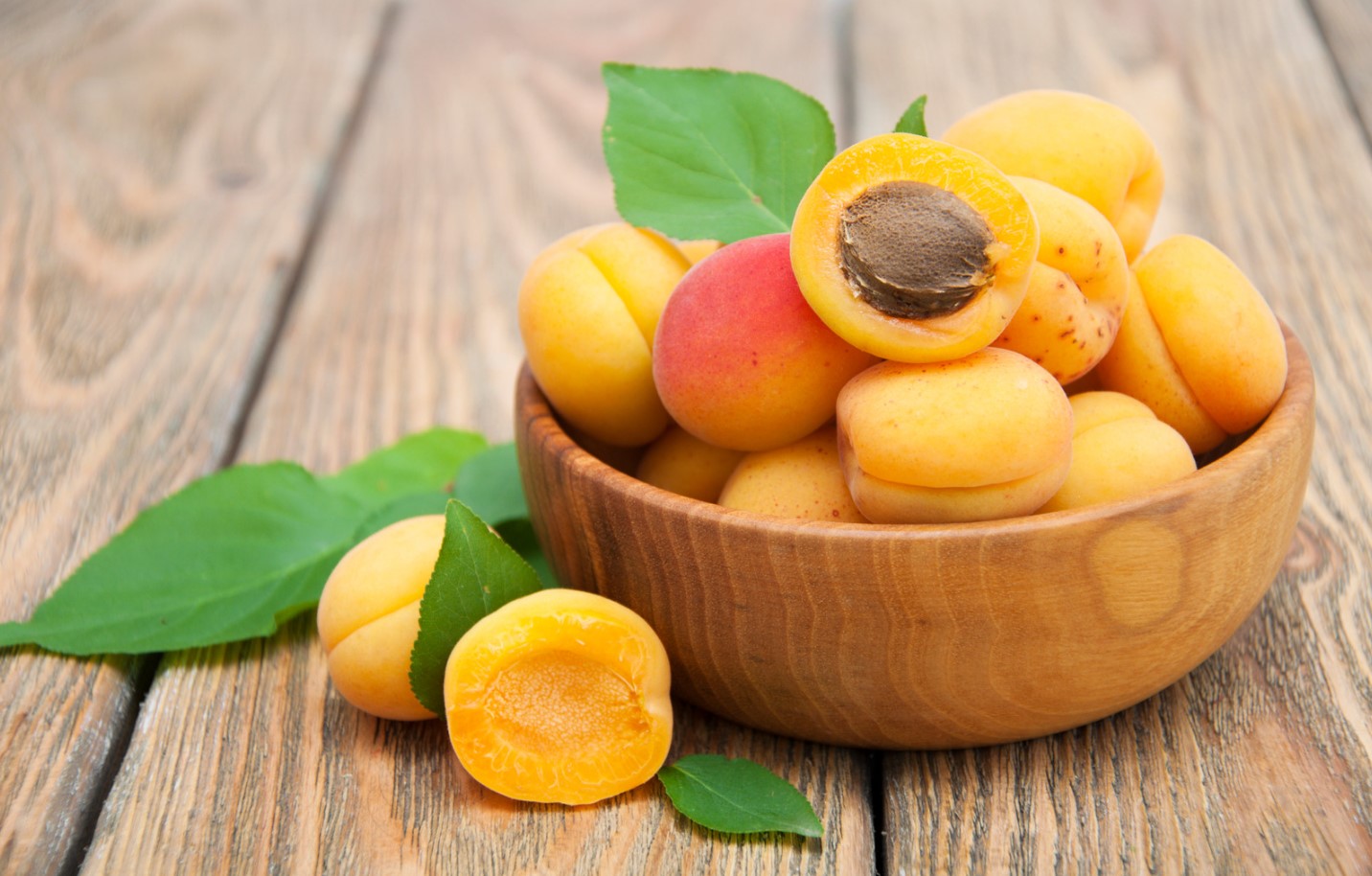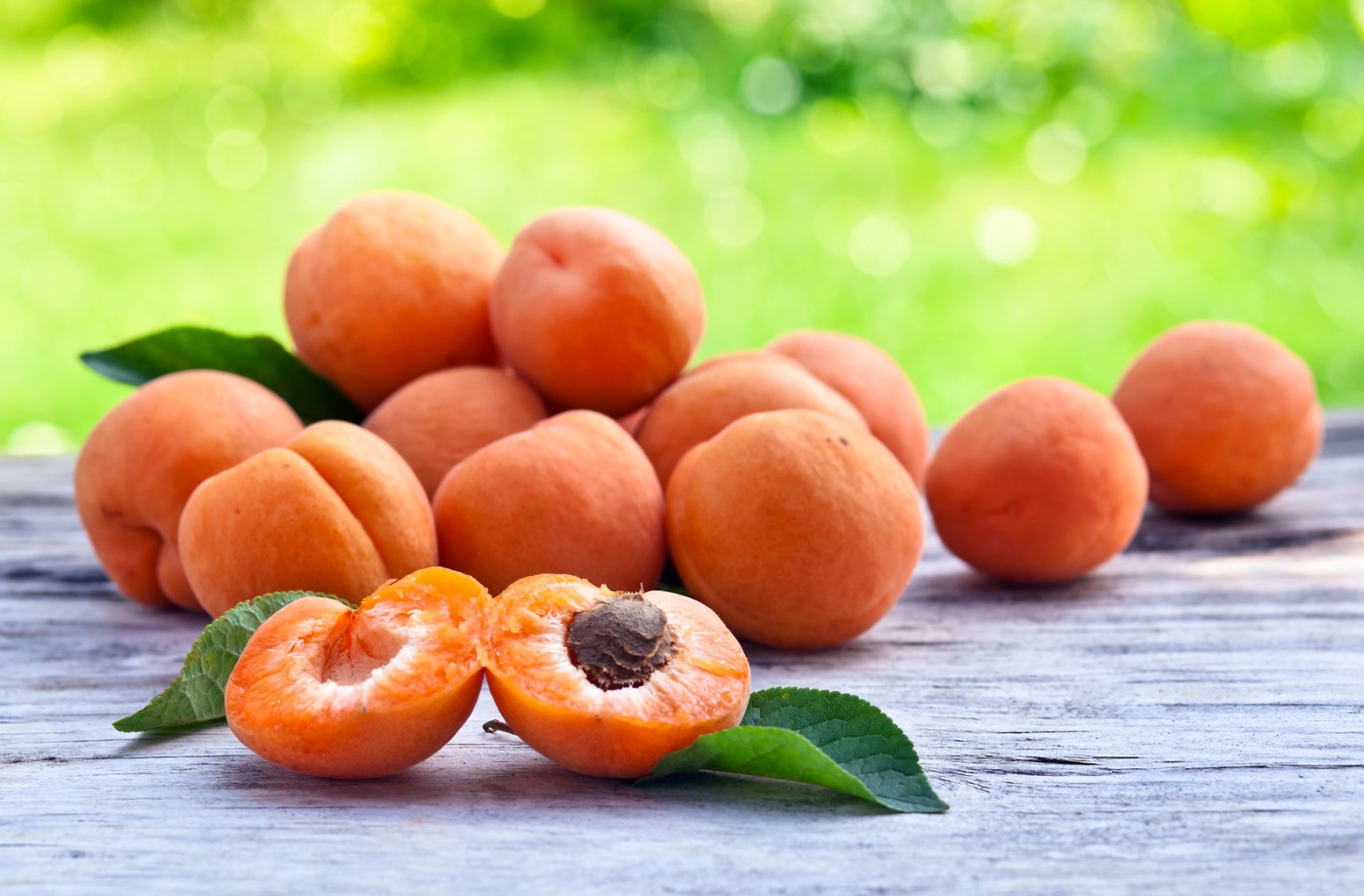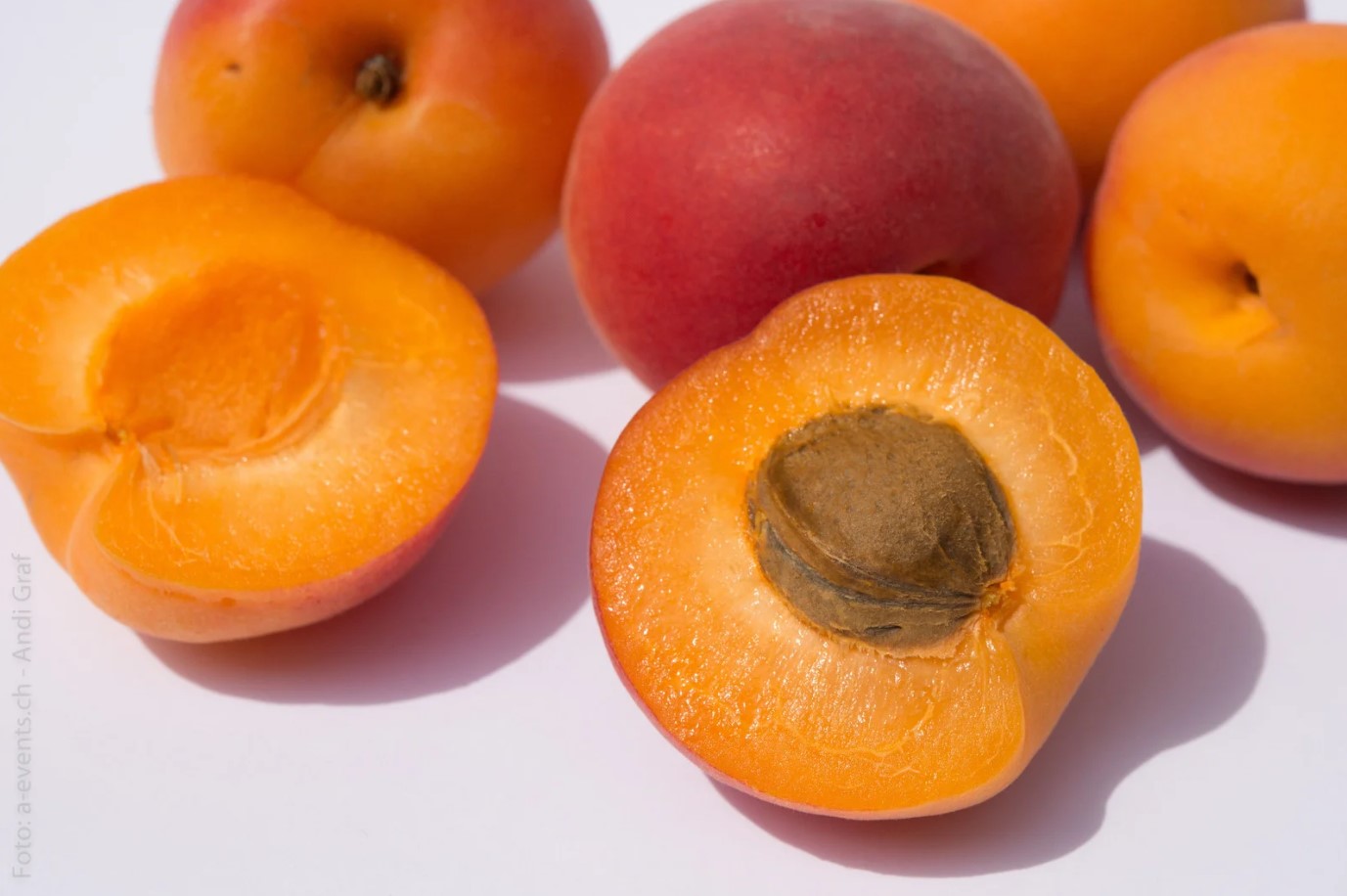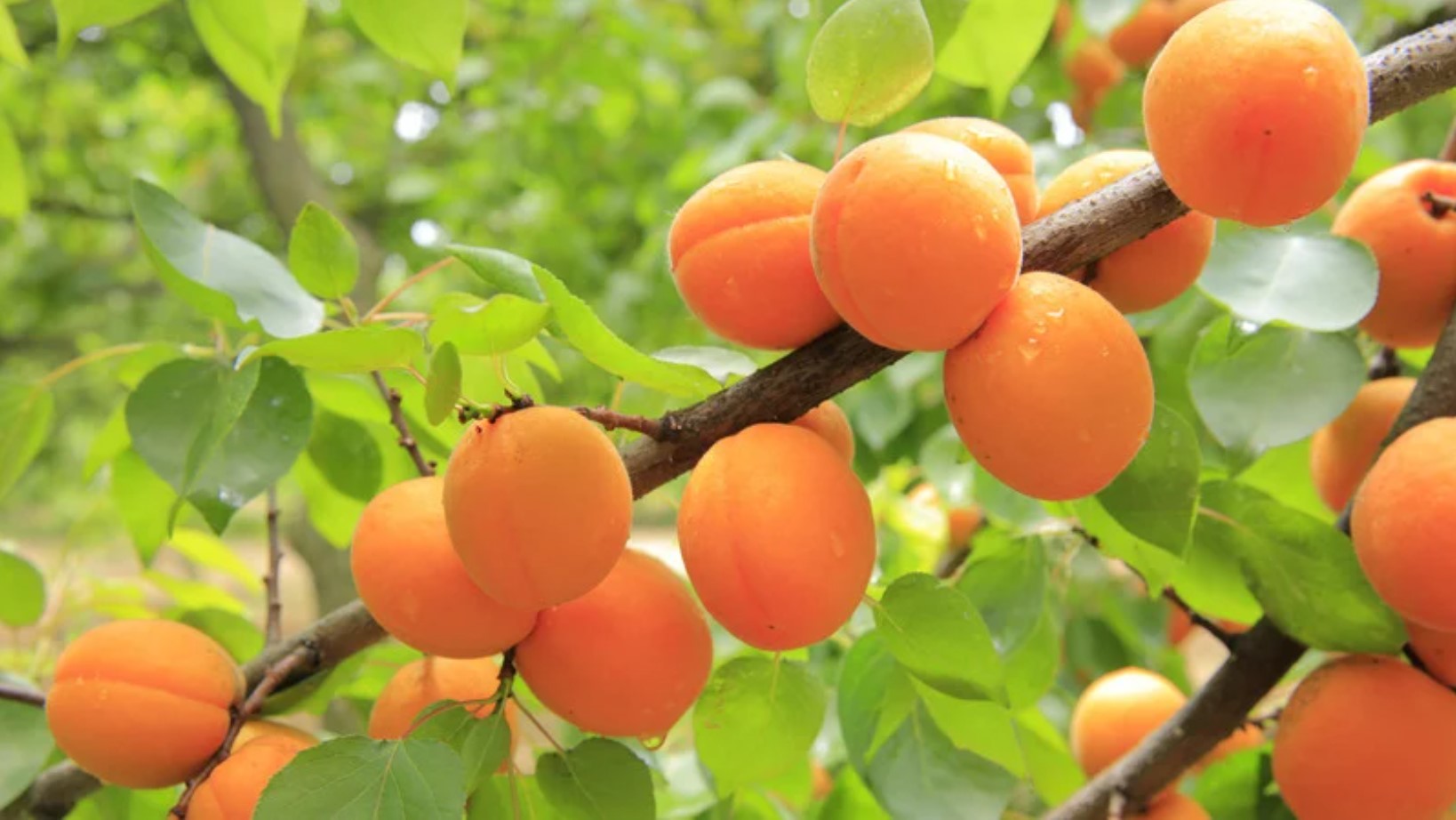What İs Apricot?
Apricot is a fruit that belongs to the Rosaceae family. This fruit is a drupe, meaning it has a hard pit in the center, which is removed before eating. The outer layer of the fruit is typically golden or orange in color and is covered with a velvety skin. Apricots can be eaten fresh, dried, or canned. They are considered a versatile fruit as they can be used in a variety of dishes.

Apricots are believed to have originated in China over 4000 years ago. The fruit was brought to Europe by the Romans, who then introduced it to the rest of the world. Today, apricots are grown in many parts of the world, including California, Turkey, Iran, and Italy. Turkey is known to be the largest producer of apricots in the world.
Apricots are a good source of vitamin A and C, potassium, and fiber. They are also low in calories and carbohydrates. Eating apricots can help improve digestion, boost immunity, and improve eye health. The fruit is also rich in antioxidants, which can help protect against disease and fight inflammation.
- Apricots are a good source of vitamin A and C
- Eating apricots can help improve digestion
- Apricots are rich in antioxidants
Apricots can be eaten fresh, canned, or dried. Fresh apricots can be eaten as a snack or used in desserts, baked goods, or sauces. Canned apricots are typically used in baking and cooking, while dried apricots make a great snack or addition to trail mix. The dried fruit is also commonly used in Middle Eastern and North African cuisine.
| Variety | Description |
|---|---|
| Perfection | Small fruit with a deep orange color and a sweet taste |
| Tilton | Large fruit with a bright orange color and a tart taste, commonly used for canning |
| Patterson | Large fruit with a bright orange color and a sweet taste, commonly used for canning and drying |
Apricots are a delicious fruit with a variety of health benefits. Whether you’re eating them fresh, canned, or dried, apricots are a great addition to any diet. Try incorporating apricots into your meals or snacks to reap the many benefits they offer.

Where Did Apricot Originate?
The apricot is a fruit that has been enjoyed for thousands of years. Its delicious, sweet taste and unique texture make it a popular choice for many people around the world. But where did this fruit originate? Let’s take a closer look at the history of apricots.
Origins:
The apricot is believed to have originated in China, where it was cultivated as early as 3000 B.C. However, the exact origin of the apricot is still a topic of debate among historians and botanists. Some experts believe that the fruit may have originated in India or Central Asia, while others claim that it was first grown in the Mediterranean region.
Spread:
The popularity of apricots soon spread beyond China, and the fruit began to be grown in other parts of Asia, as well as in Europe and the Middle East. The Greeks were known to have cultivated apricots, and the fruit was introduced to Europe by the Romans. Today, apricots are grown in many parts of the world, including the United States, Turkey, Iran, and Spain.
| Country | Production (tons) |
|---|---|
| China | 3,274,813 |
| Turkey | 765,404 |
| Iran | 600,000 |
| Spain | 324,070 |
Uses:
Apricots have been used in a variety of ways throughout history. In ancient China, the fruit was often dried and used in traditional medicine. Today, apricots are commonly eaten fresh or dried, and are used in a variety of culinary dishes, including desserts, jams, and sauces. The oil from apricot kernels is also used in cosmetics and skincare products, due to its moisturizing and nourishing properties.
If you’re a fan of apricots, it’s interesting to know the origins of this delicious fruit. From China to the Mediterranean and beyond, the apricot has had a long and fascinating history.

Nutritional Content Of Apricot
Apricots are often considered as a perfect summer fruit due to their juicy and sweet flavor. These small oval-shaped fruits belong to the Prunus family and are harvested during the months of May to August. Besides being a tasty snack, apricots also offer a bunch of health benefits due to their nutritional content.
Apricots are considered a low-calorie fruit that is rich in fiber, antioxidants, vitamins, and minerals. One apricot is said to contain only 17 calories, making it a great choice for those on a calorie-restricted diet. These fruits are also an excellent source of Vitamin C, which is essential for a strong immune system that can combat illnesses such as the common cold and flu.
- Apricots are also rich in potassium, which plays a vital role in regulating blood pressure and heart health.
- They contain Carotenoids that can reduce the risk of cancer, heart disease, and various kinds of eye diseases.
- Their fiber content not only helps with digestion but can also reduce the risk of type 2 diabetes and obesity.
| Minerals and Vitamins Found in Apricots | Amount per 100g |
|---|---|
| Calcium | 13mg |
| Iron | 0.39mg |
| Potassium | 259mg |
| Magnesium | 10mg |
| Vitamin A | 1926IU |
| Vitamin C | 10mg |
Incorporating apricots in your diet can offer numerous health benefits. Whether you eat them raw, dried, or opt for apricot-based products, their nutritional content can help maintain and improve overall health. So, next time you crave something delicious and healthy, reach for an apricot and enjoy all the goodness that it has to offer.
Apricot’s Health Benefits
Apricots are a highly nutritious fruit that is packed with numerous health benefits. These small, orange-colored fruits are part of the stone fruit family, which includes cherries, plums, and peaches. Apricots are a good source of vitamin A, vitamin C, and dietary fiber. They are also low in calories and are an excellent source of potassium. So, let’s take a look at some of the health benefits of apricots.
- Helps Improve Digestion: Apricots contain a good amount of dietary fiber that helps improve digestion. The fiber adds bulk to the stool and helps prevent constipation. It also helps maintain a healthy balance of bacteria in the gut, which aids digestion.
- Improves Eye Health: Apricots contain a high level of vitamin A, which is essential for good eye health. Vitamin A helps prevent age-related macular degeneration and cataracts. Eating apricots regularly can also help maintain healthy vision.
- Rich in Antioxidants: Apricots contain a high level of antioxidants such as vitamin C and beta-carotene. These antioxidants help protect the cells from damage caused by free radicals. Eating apricots regularly can help reduce the risk of chronic diseases such as heart disease and cancer.
Apricots are also known for their ability to reduce inflammation in the body. They are rich in flavonoids and phenolic acids that help reduce inflammation and prevent the formation of harmful cells. Eating apricots regularly can also help boost the immune system and protect the body against infections.
| Apricot Varieties | Description |
|---|---|
| Moorpark | Medium-sized, orange fruit with a tangy flavor. |
| Harcot | Large fruit with a bright orange color and a sweet flavor. |
| Gold Kist | Small, orange fruit with a sweet flavor and firm texture. |
Apricots are a versatile fruit that can be used in many different ways in the kitchen. They can be eaten fresh or dried and added to a variety of dishes such as salads, desserts, and savory dishes. Some common culinary uses for apricots include apricot jam, apricot glazed ham, and apricot chicken.
In conclusion, apricots are a superfood that is packed with numerous health benefits. They are a great source of vitamins, antioxidants, and dietary fiber. Eating apricots regularly can help improve digestion, boost the immune system, reduce inflammation, and more. So, why not add this delicious fruit to your diet today?

Apricot For Better Digestion
Apricot is a delicious fruit that is packed with numerous health benefits. One of the benefits of this fruit is its ability to aid digestion. For centuries, apricots have been used as a natural remedy for digestive disorders such as constipation and indigestion. The high fiber content in apricots helps to regulate bowel movements and prevent constipation. In addition, the fruit contains a natural laxative called sorbitol, which softens the stool and promotes regular bowel movements.
Apricots are also rich in antioxidants, which help to reduce inflammation in the digestive tract. This can help to alleviate symptoms of inflammatory bowel disease and other digestive disorders. The fruit also contains carotenoids such as beta-carotene, lutein, and zeaxanthin, which are essential for maintaining the health of the eyes and reducing the risk of age-related macular degeneration.
- To get the most digestive benefits from apricots, it is recommended to eat them fresh and ripe. You can also enjoy dried apricots as a snack or addition to your breakfast cereal.
- You can also incorporate apricots in your diet by using them in recipes such as jams, chutneys, and sauces. Apricot jam is especially delicious when spread on toast or used as a filling for cakes and pastries.
| Nutrient | Content |
|---|---|
| Vitamin A | 1,585 IU |
| Vitamin C | 0.8 mg |
| Fiber | 0.9 g |
| Potassium | 91.8 mg |
| Calcium | 3.3 mg |
Therefore, if you’re looking for a natural and delicious way to improve your digestion and overall health, add apricots to your diet. Whether you enjoy them fresh, dried, or cooked, apricots are a versatile and nutritious fruit that provide numerous health benefits.
Improves Eye Health
If you’re looking for ways to improve your eye health, adding apricots to your diet may be a good start. These delicious fruits are packed with nutrients that can help keep your eyes healthy and strong. Here’s a closer look at some of the ways that apricots can benefit your eyes:
- Vitamin A: Apricots are an excellent source of vitamin A, which is essential for maintaining good eye health. Vitamin A helps prevent night blindness and other vision problems by supporting the functioning of the retina.
- Vitamin C: Another important nutrient found in apricots is vitamin C, which is a powerful antioxidant that helps protect the eyes from damage caused by harmful free radicals.
- Lutein and zeaxanthin: Apricots also contain lutein and zeaxanthin, two antioxidants that play a key role in maintaining healthy eyes. These nutrients help protect the eyes from damage caused by UV rays and can help reduce the risk of age-related macular degeneration.
In addition to these eye-healthy nutrients, apricots are also a good source of fiber, which can help keep your digestive system running smoothly. So, if you’re looking for a tasty way to improve your eye health, try adding some fresh apricots to your diet today!

Rich İn Antioxidants
Apricots are a juicy and nutritious fruit that belong to the same family as peaches, nectarines, and plums. They’re typically orange or yellow, with a velvety smooth skin and a sweet and slightly tangy taste. In addition to being delicious, apricots are also packed with nutrients and antioxidants that can help support overall health and wellness.
Antioxidants are a group of compounds that are naturally found in many foods, including fruits, vegetables, and whole grains. They work by neutralizing harmful molecules known as free radicals, which can damage cells and contribute to a variety of chronic diseases. Apricots are particularly rich in antioxidants, making them an excellent choice for anyone looking to boost their immune system and improve their overall health.
- Apricots are a great source of vitamin A, which is important for maintaining healthy vision, skin, and immune function.
- They also contain high levels of vitamin C, which is a powerful antioxidant that can help protect against cancer, heart disease, and other chronic illnesses.
- In addition to vitamins, apricots are also rich in a variety of minerals, including potassium, magnesium, and iron. These minerals are essential for maintaining healthy bones, muscles, and blood pressure.
If you’re looking to add more antioxidants to your diet, apricots are a great choice. They can be eaten fresh, dried, or cooked into a variety of dishes, and they’re a versatile and delicious addition to any meal. So next time you’re at the grocery store, be sure to pick up a few apricots and enjoy their many health benefits!
Fights Inflammation
If you’re looking for a fruit that can help protect your body against inflammation, then look no further than the apricot! The apricot, a bright orange fruit with a velvety skin and a juicy flesh, is not only delicious but also packed with antioxidants and other nutrients that can help fight inflammation.
One of the reasons why apricots are so effective at fighting inflammation is because they contain a high level of vitamin C, which is a powerful antioxidant that helps to neutralize harmful free radicals in your body. Vitamin C also helps to stimulate the production of collagen, a protein that helps keep your skin and joints healthy.
- In addition to vitamin C, apricots also contain high levels of beta-carotene, a type of antioxidant that’s been shown to help reduce inflammation and protect your cells from damage.
- Apricots are also a good source of dietary fiber, which can help to keep your digestive system healthy and reduce inflammation throughout your body.
There are many different ways to incorporate apricots into your diet, whether you prefer to eat them fresh or dried. You can add apricots to your morning cereal or oatmeal, mix them into a fruit salad, or even use them as a topping for your favorite yogurt or ice cream. If you’re looking for a tasty snack, try eating a handful of dried apricots, which are a great source of both fiber and antioxidants.
So if you’re looking for a natural way to fight inflammation and protect your body against disease, be sure to add some delicious apricots to your diet today!

Boosts Immune System
Apricots are not only sweet and juicy, but they are also packed with nutrients that make them beneficial to your health. One of these benefits is its ability to boost your immune system. Apricots are rich in vitamin C which is a powerful antioxidant that has numerous benefits for your immune system. Vitamin C helps stimulate the production of white blood cells which helps fight against infections and illnesses. It also helps protect your cells from damage caused by harmful molecules known as free radicals.
In addition to vitamin C, apricots are also rich in vitamin A and potassium which are essential for strengthening your immune system. Vitamin A helps regulate your immune response while potassium helps regulate the balance of electrolytes in your body fluids. Potassium also helps with muscle function, including your heart muscles.
- Furthermore, apricots also contain other nutrients that can help boost immunity such as:
- Iron: Helps produce red blood cells which carry oxygen throughout your body.
- Dietary fiber: Helps with digestion and can prevent the growth of harmful bacteria in your gut.
With all these nutrients combined, apricots are a great choice to add to your diet if you want to boost your immune system. Eating them regularly can help improve your overall health and protect you against common illnesses and infections.
| Vitamin | Amount per 100g | % Daily Value |
|---|---|---|
| Vitamin A | 1926 IU | 38% |
| Vitamin C | 10 mg | 17% |
| Potassium | 259 mg | 7% |
| Iron | 0.39 mg | 2% |
Apricot İn Skin Care
Apricots are well-known for their soft, juicy and flavorful flesh. However, what most people don’t know is that apricots are also great for your skin! The benefits of apricot in skin care are significant, and incorporating apricots into your skincare routine could do wonders for your skin.
Apricots are a rich source of Vitamin A, which aids in maintaining healthy skin. This vitamin is known for its ability to keep the skin looking youthful and hydrated. Additionally, apricots also have Vitamin C, which is known for its collagen-boosting properties. Collagen is a protein that helps keep your skin flexible, elastic and in shape. Incorporating apricots into your diet or applying apricot oil to your skin can add a boost of both vitamins.
- Apricot oil is a great natural moisturizer for dry and cracked skin. The oil is absorbed rapidly, leaving no residue behind. It also minimizes fine lines and wrinkles, giving the skin a youthful and refreshed appearance.
- Apricot kernels, which can be turned into apricot kernel oil, have a high content of essential fatty acids and Vitamin E. This combination of elements can also help to moisturize and soften the skin.
- Apricot scrubs can help to exfoliate and rejuvenate the skin. By eliminating dead skin cells, this treatment can help to improve skin texture and fade away blemishes and dark spots.
Apricots are also known to contain antioxidants and anti-inflammatory properties. These elements help to protect the skin from harmful free radicals that can cause skin damage, and reduce inflammation in the skin, in turn reducing redness and pimples. Incorporating apricots into your daily skincare routine not only helps your skin look and feel better, but it also protects it from further damage.
| Apricot Benefits for Skin: | |
|---|---|
| Moisturizes and softens | Contains essential fatty acids and Vitamin E |
| Exfoliates and improves skin texture | Eliminates blemishes and dark spots |
| Protects the skin from harmful free radicals | Reduces inflammation in the skin |
If you have never tried adding apricots to your skincare routine, now is the perfect time to start. With its high nutritional content, apricots offer a wide range of benefits for your skin. Whether you use apricot oil, scrubs, or eat fresh apricots, incorporating apricots into your daily routine can help to keep your skin feeling and looking its best. Give it a try and see how your skin will thank you for it!
Preserving Apricots For Later Use
Apricots are delicious fruits enjoyed by many around the world. However, due to their short season, it can be tough to enjoy them all year round. This is where preserving comes into play. There are many methods of preserving apricots, and each can give you delicious fruit long after the season is over.
One of the most common methods of preserving apricots is drying. Dried apricots are a popular snack and can be easily stored in an airtight container for up to six months. To dry your apricots, wash them thoroughly and slice them in half. Remove the pit and place them on a baking sheet, then set the oven to 130°F or the lowest temperature possible. Keep the oven door slightly open and let them dry for 6-8 hours or until they’re dry and chewy.
- Another way to preserve apricots is through canning. Canned apricots can last for up to a year and can be used in many recipes, from pies to sauces. To can your apricots, wash them and slice them in half. Remove the pit and place them in a saucepan. Add enough water to cover the apricots and bring to a boil. Reduce the heat and let them simmer for 15-20 minutes. Sterilize your jars and lids, and add the apricots along with some of the cooking liquid. Process in a water bath for 15 minutes, and your canned apricots are ready to go!
- If you have a freezer, freezing your apricots is also an option. Wash them, slice them in half, and remove the pit. Place them on a baking sheet and freeze for a few hours. Once they’re frozen, transfer them to an airtight container and store them in the freezer for up to six months. Frozen apricots are great for smoothies or baked goods.
Regardless of the method you choose, preserving apricots is a great way to enjoy this delicious fruit all year round. Whether you dry, can, or freeze them, apricots can add a burst of flavor to any recipe.
Common Culinary Uses For Apricot
Apricots, with their juicy flesh and sweet flavor, are a versatile fruit that can be used in various dishes. Here are some common culinary uses for apricots:
- Baking: Apricots can be used in baked goods such as cakes, muffins, and pies. They can be used fresh, dried, or canned depending on the recipe. Dried apricots are particularly useful in baking as they add a chewy texture and intense flavor.
- Preserves: Apricots can be made into preserves, jams, and marmalades. These spreads can be used on toast, scones, and even as a topping for ice cream.
- Sauces: Apricot sauce is a popular accompaniment to meats, particularly pork and chicken. It can also be used in stir-fries and as a dip for finger foods.
Aside from these common uses, apricots can also be used in salads, smoothies, and cocktails. The possibilities are endless when it comes to this delicious fruit.
While apricots are a delicious addition to any dish, it is important to note that they are also packed with nutrients. One cup of sliced apricots contains 72% of the recommended daily intake of vitamin A, which is essential for eye health. They are also a good source of fiber and potassium.
| Additional Apricot Trivia: |
|---|
| Apricots are believed to have originated in China over 4000 years ago. |
| California produces over 90% of the apricots grown in the United States. |
| The pits of apricots are sometimes used in cooking to add an almond flavor. |
In conclusion, apricots are not only delicious but also versatile in the kitchen. With their numerous health benefits and various culinary uses, they are definitely a fruit worth trying.
Different Varieties Of Apricot
If you love apricots, then you might be surprised to know that there are actually different varieties of this fruit. Each variety has unique characteristics that make them a favorite over the other. In this article, we will talk about the different varieties of apricot and what sets them apart from each other.
1. Hargrand: This variety of apricot is characterized by its large size and deliciously sweet taste. It has a beautiful orange-red color that makes it an attractive ingredient in any recipe. Hargrand apricots are generally used for canning and preserves.
2. Sugar hearts: These apricots are smaller compared to other varieties, but they are famous for their exceptional flavor. They have a beautiful pinkish-red blush that covers most of the fruit. Sugar hearts are perfect for eating fresh or using in desserts.
- 3. Chinese: Also known as the “Moorepark” variety, Chinese apricots are oval-shaped and are slightly larger than Sugar heart. They have reddish-orange skin and develop a flavorful taste as they ripen on the tree. Chinese apricots are typically consumed fresh or dried.
4. Blenheim: This variety of apricot has golden skin and a sweet, tangy taste. They are great for use in baking because they hold their shape well and retain their sweetness. Blenheim apricots are also perfect for making jams, preserves, and pies.
| Variety | Color | Uses |
|---|---|---|
| Hargrand | Orange-red | Canning and preserves |
| Sugar hearts | Pinkish-red | Consumed fresh or used in desserts |
| Chinese | Reddish-orange | Consumed fresh or dried |
| Blenheim | Golden | Baking, jams, preserves, and pies |
Apricots are a versatile fruit that can be used in a variety of dishes. Whether you prefer them fresh, dried, or in your favorite recipe, apricots bring a unique sweetness to every dish. With so many different varieties to choose from, the possibilities for using apricots are endless. So, go ahead and slice up a few of your favorite varieties and enjoy them in a fresh fruit salad or baked in your favorite dessert.
Apricot Trivia And Fun Facts
Apricots are a delicious fruit known for their sweet and tangy taste. However, did you know that this fruit is also packed with interesting facts and trivia? From its origin to its various uses, here are some fun facts about apricots that you may not know.
Apricots originated from China! The fruit is believed to have existed in China since 3000 B.C. and was later introduced to the Western world through Armenia. In fact, the scientific name of the fruit is Prunus armeniaca, which means Armenian plum. The fruit then spread throughout the Mediterranean and was ultimately cultivated in many parts of the world.
Although apricots are widely loved, many people may not know that they are also rich in nutritional content. These fruits contain important vitamins and minerals, such as vitamin A, fiber, and potassium. As a result, they provide numerous health benefits that make them an excellent addition to any diet.
- Did you know that apricots were often used in ancient medicine? Apricots were known for their medicinal value, and were used to treat various ailments such as constipation and indigestion. This is because they contain natural laxatives that help to improve bowel movements and promote digestive health.
- Apricots are also beneficial to eye health. They contain antioxidants like lutein and zeaxanthin, which help to protect against age-related eye diseases like macular degeneration and cataracts.
- In addition, apricots are rich in anti-inflammatory compounds. These compounds help to reduce inflammation in the body, which is linked to various chronic health conditions like arthritis and heart disease.
Aside from their numerous health benefits, apricots are also widely used in various culinary dishes. They can be eaten fresh or dried, and are commonly used in cakes, pies, jams, and other sweet treats. Additionally, they can be turned into a delicious and refreshing smoothie.
- Have you ever wondered what the word ‘apricot’ means? The word ‘apricot’ comes from the Latin word ‘praecocia’, which means ‘precocious’. This is in reference to the fact that apricots tend to bloom earlier than other fruits.
- Another interesting fact is that apricots were considered an aphrodisiac in ancient times. This is because they were believed to give the body strength and vitality. In some cultures, couples were even given apricots on their wedding night to increase their fertility.
- Lastly, did you know that apricots have a symbolic meaning in certain cultures? They are often associated with good luck, health, and happiness. In China, apricots are a symbol of femininity and are often given as gifts to celebrate women.
There you have it, some fascinating facts about apricots. Whether you eat them for their nutritional value, health benefits, or simply because they taste delicious, apricots are a fruit that everyone can enjoy. So, the next time you bite into an apricot, remember all the interesting things that make this fruit so special.
Conclusion: Why You Should Try Apricots
Apricots are a fruit that is quite underrated, yet has plenty of health benefits. They are tasty and juicy, with a satisfying texture. Apricots are loaded with vitamins and nutrients that your body needs to thrive, and there are many reasons why you should include them in your diet. Whether you eat them fresh, dried, or canned, apricots are versatile and delicious.
Firstly, Apricots are an excellent source of Vitamin A, C, and K. The Vitamin A in apricots is fantastic for promoting good hair and skin health, as well as improving eyesight. Vitamin C works as an antioxidant, helping to keep your immune system strong, while Vitamin K works with calcium to keep your bones healthy and strong.
Secondly, apricots are low in calories, making them an excellent snack choice for weight-conscious people. They are full of fiber, keeping you feeling fuller for longer, which can help prevent overeating. Also, apricots are abundant in potassium, an essential mineral that helps regulate fluids and electrolyte balance in the body, as well as reducing the risk of kidney stones.
- Add apricots to your morning smoothie
- Use apricots to make a delicious chutney or jam
- Make an apricot sauce for roasted meats
In conclusion, apricots are a delicious and nutritious fruit that can be eaten in many ways. From promoting good health to aiding weight loss, apricots are a great choice for anyone looking to make a positive change in their diet. So, grab some fresh apricots or add them to your grocery list and give them a try today.